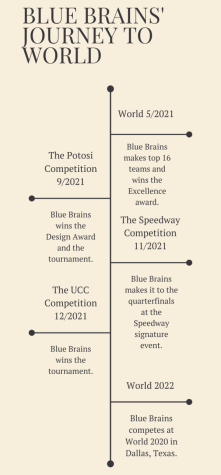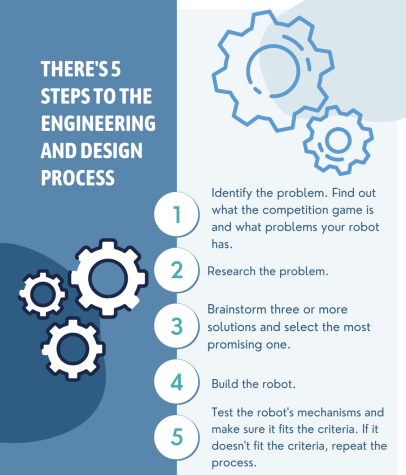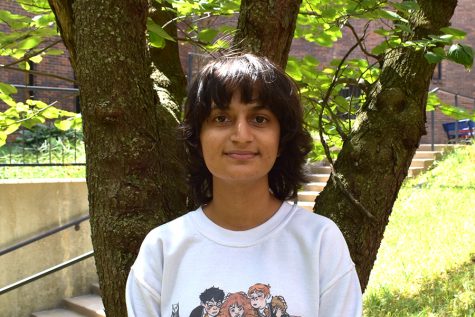
Tucked away in the school’s most remote classroom, students spend hours after hours tinkering with mechanical parts, writing sophisticated codes and reworking robots to execute extremely precise tasks. Whether during AcLab, after school or during the 12-hour practices on weekends, the 5430-A robotics team, better known as Blue Brains, prepares to compete in May at the VEX Robotics World Championships (World) in Dallas, Texas.
Blue Brains was part of four new teams formed within the school two years ago— a collection of seemingly very different students with little in common. As other teams have shifted and merged over the years, Blue Brains has remained largely the same, with senior Rick Biswas now as the Team Lead and junior Anushka Dharmasanam as Design Head.
“It’s kind of funny how our team was formed,” Dharmasanam said. “At the time, none of us really had another place to fit in. It was our first year [in robotics for all of us] except for our Team Lead at the time [Levi Ladd]. He basically put together this group of people who didn’t fit into another category, and we still facetime him at meetings to show him our robots and progress. It’s absolutely crazy how much I’ve grown close to my teammates in the past two years; we have a bond that can’t be broken.”
The team qualified for World 2022 by winning their division and the Excellence Award last year, making it to the top eight alliances, or top 16 individual teams, during the Semifinals. This year, their goal is to perform even better as well as win an award at the smaller signature events, which are competitions that would typically qualify a team for World. Unlike during virtual learning, the robotics teams have had more chances to collaborate and help each other, and the new robot is already in the works.

“Last year, we were four completely separate teams, but this year, we have the chance to talk with each other and help each other out. We have so many competitions back to back that it’s always a race against the clock to get a new robot out. It’s stressful but a healthy stress,” Dharmasanam said. “It’s pretty fun because even though we all started out as strangers, we’re like a second family. We joke that we see each other more than we see our own families.”
The team has had other successes as well, including winning a tournament and the Design Award for their engineering notebook, a log of the robot-building process. According to Biswas, they’ve also been taking more risks by taking apart old robots for upcoming competitions only a couple of weeks in advance, often spending up to 12 hours on weekends and 20 hours per week to make sure it’s ready in time.
“For those [12-hour] meetings, we divide it up between having the actual meeting and hang-out time. At the beginning, it feels really overwhelming because there’s so much to do, but we get over that,” Biswas said. “Actually, a lot of what we do is similar to what experienced mechanical and aerospace engineers do. I’m really going to miss the small breakthroughs we have next year and the small moments of happiness that built my passion for robotics.”

![The Blue Brains team members juniors Katherine Hanses, Joseph Britt, Isaac Porter and Anushka Dharmasanam and seniors David Meisinger and Rick Biswas pose in front of their robot and awards at the Speedway signature event in Indianapolis. The awards include their trophies from smaller competitions and World 2021, as well as a small trophy gifted to the team for their performance by robotics sponsor Chris Donaldson. “The trophy was for just being a good team, because this was our first big signature event outside of the virtual ones we did last year,” Hanses said. “[At this competition], we had six matches on the first day, and we won five. We got knocked out in the quarterfinals.”](https://pwestpathfinder.com/wp-content/uploads/2021/12/5430A_SpeedwayPit-900x675.jpg)


![Smiling in a sea of Longhorns, Fox 2 reporter Ty Hawkins joins junior Darren Young during the morning Oct. 3 pep rally. The last time West was featured in this segment was 2011. “[I hope people see this and think] if you come to [Parkway] West, you will have the time of your life because there are so many fun activities to do that make it feel like you belong here. I was surprised so many people attended, but it was a lot of fun,” Young said.](https://pwestpathfinder.com/wp-content/uploads/2025/10/Edited2-1200x798.jpg)
![West High seniors and families listen as a representative of The Scholarship Foundation of St. Louis, Teresa Steinkamp, leads a Free Application for Federal Student Aid (FAFSA) workshop. This session, held in the library, provided guidance on financial aid, scholarships and student loan options. “This event is very beneficial for any seniors who are applying to or considering applying to colleges after high school [because] the cost of college is on the rise for seniors and parents,” college and career counselor Chris Lorenz said.](https://pwestpathfinder.com/wp-content/uploads/2025/09/DSC_4478-1200x778.jpg)
![Senior Kamori Berry walks across the field during halftime at the Homecoming football game on Sept. 12. During the pep assembly earlier that day, she was pronounced Homecoming Queen. “I thought it was nice that the crowd [started] cheering right away. I know [my friends] were really excited for me, and my family was happy because typically non-white people don't win,” Berry said.](https://pwestpathfinder.com/wp-content/uploads/2025/09/DSC7046-Enhanced-NR-1200x798.jpg)



![Pitching the ball on Apr. 14, senior Henry Wild and his team play against Belleville East. Wild was named scholar athlete of the year by St. Louis Post-Dispatch after maintaining a high cumulative GPA and staying involved with athletics for all of high school. “It’s an amazing honor. I feel very blessed to have the opportunity to represent my school [and] what [it] stands for,” Wild said.](https://pwestpathfinder.com/wp-content/uploads/2025/05/unnamed-6-1200x714.jpg)
![The Glory of Missouri award recipients stand with their certificates after finding out which virtue they were chosen to represent. When discovering their virtues, some recipients were met with contented confirmation, while others, complete surprise. “I was not at all surprised to get Truth. I discussed that with some of the other people who were getting the awards as well, and that came up as something I might get. Being in journalism, [Fellowship of Christian Athletes and] Speech and Debate, there's a culture of really caring about truth as a principle that I've tried to contribute to as well. I was very glad; [Truth] was a great one to get,” senior Will Gonsior said.](https://pwestpathfinder.com/wp-content/uploads/2025/04/Group-Glory-of-Missouri.jpg)

